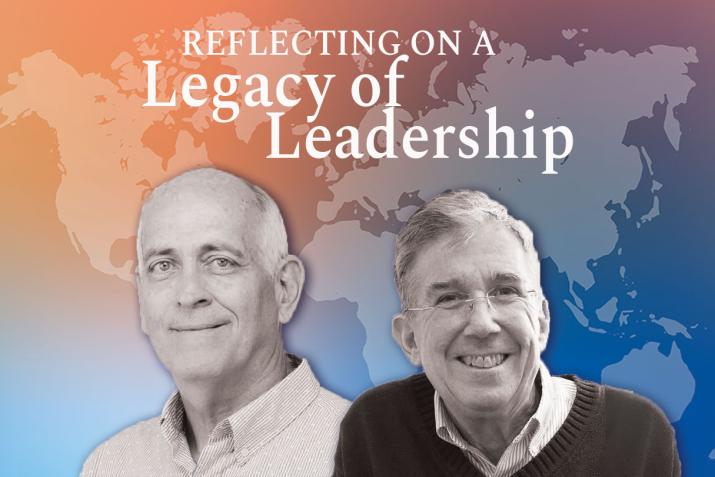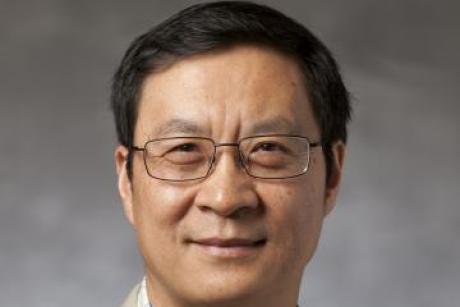With a combined 23 years in the Duke Global Health Institute’s leadership, John Bartlett, M.D., and Randy Kramer, Ph.D., know the institute better than just about anyone.
Both were present in DGHI’s formative days. (In fact, Bartlett, a professor of medicine with a long history in HIV research and clinical care, served on a 2004 committee that laid the groundwork for the institute’s founding two years later.) And both had significant roles in its development during the past decade: Bartlett served as DGHI’s associate director for research from 2008-2020, and Kramer, the Juli Plant Grainger Professor of Global Environmental Health, was associate director for strategy in 2010-2011 and deputy director from 2011-2019. Kramer also served as DGHI’s interim director during the summer and fall of 2017.
On June 30, Bartlett and Kramer each will officially retire from their Duke positions – although in true DGHI fashion, neither plans to disappear entirely from global health work. But before they start ducking out of faculty meetings, we met over Zoom to reflect on their careers and memories from the early days of the institute. This transcript has been edited for length and clarity.
As you look back at your time with DGHI, what are you proudest of?
Bartlett: I think I’m proudest of the growth of our faculty. And by growth, I mean in several different areas. I mean growth in terms of numbers, I mean growth in terms of multiple disciplines and interdisciplinary work, and I mean growth in terms of faculty success and progression.
Take K awards to young faculty – they have been so successful in getting K awards and making the transition from K to R awards. And it’s a challenging time for young faculty. Also, there’s been tremendous growth in terms of faculty commitment to capacity building with our partners – we’ve seen increasing numbers of D43 awards or similar awards to help to strengthen our partners. So I look quite proudly and with a great sense of admiration for those accomplishments.
Kramer: I would also start with the recruitment of dozens of highly qualified faculty from all across the university. That's just been so exciting to watch that unfold.
A few years ago, we did a survey of the faculty about what they valued most about their affiliation with DGHI, and they said they were not only pleased that their research was generating high-impact publications, but their work was making a difference in the lives of patients, community members, colleagues and students as well as overseas. So it’s gratifying to watch that stream of talented faculty come to Duke – not all because of DGHI, but DGHI has played a big role in convincing people to come to Duke who might not otherwise have done so.
I think the second thing I’m proudest of is the launch of our education programs that serve all learners at Duke – undergraduates, professional students and graduate students. I was really happy when we were able to get the undergraduate co-major started in 2013. It's not easy to get majors approved at Duke and particularly one that's run by an interdisciplinary institute. The fact that we were able to do that was enormously gratifying in terms of being able to contribute to undergraduate education at Duke.
What are some of the seminal moments from the growth of the institute during the past decade?
Kramer: How many can I list? Well, I think certainly the launch of the master’s program in 2009, which at that time was one of only two such master’s programs in the country. That was a really important stake in the ground for DGHI.
I think that the $20 million endowment gift from the Bill & Melinda Gates Foundation in 2015 was an important signal that DGHI had reached a critical mass in terms of programming, faculty recruitment and impact, and that it would continue to be an important part of the university for years to come.
I guess I would add one more that was particularly enjoyable for me, and that was the 2016 partnership conference that was part of DGHI’s 10th anniversary event. We were able to bring two dozen or so of our partners from 14 countries. We all sat together and shared our experiences, and, most importantly, we planned new collaborations. I thought that was just a fantastic moment.
Bartlett: Absolutely. I can tell you that partnership conference was at the top of my list because it was so unique. Other people had not tried to do this. It was intimate, it was respectful, and it was a mutual exchange of ideas. And I think for the two of us, we had the chance to serve as an important interface with our partners, and to receive trust is such a privilege. We received trust from our partners from quite different backgrounds in the context of that conference, and it was a special feeling.
I also thought the second partnership conference in Kenya (in 2019) was quite successful. One of the projects to come out of that conference on adolescent mental health has taken off. That database is so rich, and it represents this international collaboration. And I think in years to come, it's going to be a fantastic resource for understanding adolescent mental health, and it started at that partnership conference. So I think these efforts to have cross-partnership collaborations are just so unique and so much fun to watch.
You were both doing global work before the institute existed, and there were many faculty and students who were engaged globally. How did the formation of the institute change things?
Bartlett: The institute changed things by offering us a common identity and a forum to talk to each other. I think having that forum, having that shared intellectual focus, is critically important.
And I have to credit (DGHI founding director) Mike Merson, because Mike did such a good job of paying attention to every department, every school and every institute on campus to recruit interest. His networking ability was absolutely foundational and helped us to establish our identity.
Kramer: I would mention a few things. One, of course, was the huge expansion of the global health teaching enterprise that couldn't have happened without DGHI. I think a second thing is that DGHI fostered a really rich research environment, based on pilot grants and mentoring that John led, that forged so many new interdisciplinary collaborations, bringing people together from different schools who might not have even known each other before. And that also was a real game-changer.
And then underlying all of these activities was a wonderful, dedicated staff that made it so much easier for our faculty and students to conduct research and training activities around the world. It just made it possible for everybody to elevate their game in terms of what they were doing.
A DGHI professor recently remarked that it’s possible to make interdisciplinary connections in many universities, but those collaborations tend to fall apart when you start trying to write joint grants or mentor students across disciplinary lines. The point being that making those complex collaborations easier is really the magic of DGHI. Do you agree?
Bartlett: I would certainly agree with that statement, and again I think it comes down to a whole series of factors that facilitated such an approach. Mike (Merson) was part of it, because he was absolutely fearless in crossing boundaries, and I think he promoted that kind of attitude.
I think the faculty were ready for this and embraced the opportunity. Also, I have to credit our grants management staff and our research administration who were open to not just supporting such efforts, but leading these efforts. And these kinds of projects are complicated to put together, but I think our grants management staff and research administration did a fantastic job of helping to make things work.
Kramer: We’ve also been fortunate to have university leadership that has truly valued interdisciplinary activity and actually put in place incentives to encourage it. A good example is how the interdisciplinary institutes return the indirect costs from research grants back to the schools, so the schools don’t feel that they’re in competition with DGHI or the other institutes.
How significant has that commitment to interdisciplinary approaches been to DGHI finding its place on the global health landscape?
Kramer: It's something that I think all global health programs aspire to, but we have been able to pull together an array of disciplines that I think was unprecedented. It’s amazing when we look around and we see cultural anthropologists working with psychiatrists and engineers working with public health experts.
I think it’s had a huge impact on the research program and our success in getting grants. John, wouldn’t you say that just about every grant proposal that goes out has a fair amount of interdisciplinarity built into it?
Bartlett: Absolutely. I think a fantastic example is the work Tamara Fitzgerald is currently doing with colleagues in the Pratt School of Engineering to develop practical tools to address gastroschisis and the need for low-cost laparoscopes in resource-limited settings. Some of this has been facilitated by programs such as Bass Connections. It is amazing to see what engineers can do when you point them in the direction of a practical problem and say, how can you help us? They are brilliant at coming up with creative approaches.
What has the DGHI community meant to your own research and teaching?
Bartlett: I’m trained as an infectious diseases physician, and my particular research focus was on HIV/AIDS. In the context of caring for people in Tanzania with HIV, I encountered issues having to do with mental health, having to do with cancer, having to do with substance abuse, and having to do with noncommunicable diseases. I didn’t have the tools myself to diversify a research program that could handle these other entities, but by partnering within DGHI, I have experts who can assist with these issues.
A second area where it's made a huge difference is education. I was not an educationalist, but (Duke educational technology consultants) Lisa Croucher and Marc Sperber helped me so much to understand the innovations we could try to introduce in our training programs. For the past 10 years, I have been principally focused on education and capacity building, and I never could have done that without DGHI.
Kramer: In terms of my own research on the relationship between environmental quality and infectious disease, DGHI has made it possible, and enjoyable, to do work with international teams made up of natural scientists, social scientists and medical experts. It has facilitated a type of work that I could not have done without DGHI.
On the education side, probably one of the most rewarding things that has resulted from DGHI’s presence on this campus is that it's allowed me to mentor some truly exceptional undergraduates interested in global health. These are students who have gone on to medical school, to graduate programs and to important positions in the global health workforce, and I would not have had the opportunity to work with them if I had not been affiliated with DGHI.
As you look back over the past decade, what are some of the biggest changes you have seen in global health?
Kramer: One we’ve talked about already is a greater embrace of interdisciplinarity, and even a redefinition of interdisciplinarity to broaden the reach. Reflecting my own interests, I think there’s a greater recognition of the interplay between the health of the environment and the health of humans – so, for example, with our most recent history, realizing that failure to take care of our ecosystems is contributing to pandemics and also to climate-related illnesses, I see much more focus on that now in global health.
And then I think there is also a greater emphasis on the importance of amplifying voices of our global health partners in low-resource settings, which of course is related to the decolonization movement that we've heard so much about in recent years. But it’s something that we've been focused on quite a bit in DGHI from the very beginning. As John said earlier, there has been a commitment to building trust with our global health partners and treating them as equals.
Bartlett: A big change is that global health has become oriented beyond infectious diseases and is considering noncommunicable diseases, especially issues related to cardiovascular disease, mental health, cancer and emergency medicine. And so I see a great broadening of the potential topics for study.
I think Randy’s point about interdisciplinarity is crucial. To identify pieces of solutions absolutely requires such a broad approach. And the point about decolonizing global health, I think, is really about having more equitable partnerships. It’s basically unethical to have a research environment where the benefits go only one way. It has to be coupled with capacity building. It can include provision of equipment, it can include education and training. But these global partnerships have to be a two-way street.
Finally, I would put an emphasis on implementation science, because I think it’s important for bidirectional learning. How can we take some of the interventions from the global north and implement them in the global south? Because the environment and the resources are quite different. The same thing is true for innovations in the south – how can we take them and bring them to the north? And I think implementation science helps us guide that process.
In light of those changes in the field, what advice would you offer to DGHI’s next director?
Bartlett: I think the most important thing for the incoming director is to network. I think we need someone who's prepared to go out and meet people and brainstorm about potential partnerships, both on Duke’s campus and outside of campus.
Secondly, I think it is essential to support young faculty and their development, to give them transparent, continuous feedback so that they can grow in their careers. Thirdly, I think it's essential to continue support for the educational endeavors. We need to have a steady stream of people who are interested in global health and want to be part of this enterprise.
The new director both has to come with her or his own energy, but also has to feed off the energy of existing faculty. She or he needs to excite them, but also to grow with their excitement.
Kramer: Some of this will sound familiar. From day one, the new director should be focused on building alliances with the deans of Duke’s excellent professional schools. I just cannot overemphasize that. There are still so many opportunities to deepen global health activity in Engineering, Environment, Public Policy, Law and Business. But to pursue those opportunities, the next director will need to invest time to develop the relationships and then to co-identify new collaborations.
And then I think it's really important for the next director as quickly as possible to get to know our overseas partners. We have 10-12 locations where we have longstanding, deep, productive research and teaching collaborations, and I honestly think that those partnership locations have been key to our past success and will continue to make DGHI a special place for global health research and teaching.
What’s your most memorable moment from the field?
Kramer: You know, I’ve had so many wonderful experiences traveling and working with partners in the field, but I think the best has been camping next to a beautiful national park in Madagascar with students, staff and faculty both from Duke and from universities in Madagascar. On these trips, we would work all day collecting data, and then in the evening, we would have these great multilingual dinner conversations in French, English and Malagasy about health, nature and politics. Those were truly some of my most exciting and enjoyable moments conducting research and mentoring students.
Bartlett: My most cherished experiences happened in Pakistan. This was back in August 1990. My parents were living there, and my father had had a heart attack. I went to help out, and while I was there, I had some extra time. So I went to a leprosy hospital, where I was helping to take care of patients with leprosy and establishing diagnoses.
At the end of this particular outpatient clinic, we were talking about the philosophy of care of patients with leprosy. A lot of it had to do with stigma, and how you could keep people integrated into society so that they could avoid the stigma of leprosy. And so I raised my hand and I said that in the U.S. I take care of patients with HIV, and stigma is a huge issue. And it was an instant revelation of the importance of the socio-behavioral determinants of health.
A second lesson I had during that trip came when I went with some community health workers to some of the squatter villages around Karachi. We went from house to house measuring the weight of children so that if we identified children who weren’t gaining weight, we could send them to a pediatrician. That simple intervention decreased under-five mortality in this village. So the simple things count.
What a wonderful thought to end on. Any closing thoughts?
Kramer: Just thanks for the opportunity to reflect. It's been a really fun ride for me and John, my next-door neighbor in Trent Hall for all those years. It's so wonderful to see where the institute is now and how it continues to thrive. And I’m sure it will continue to do so under the next director.



